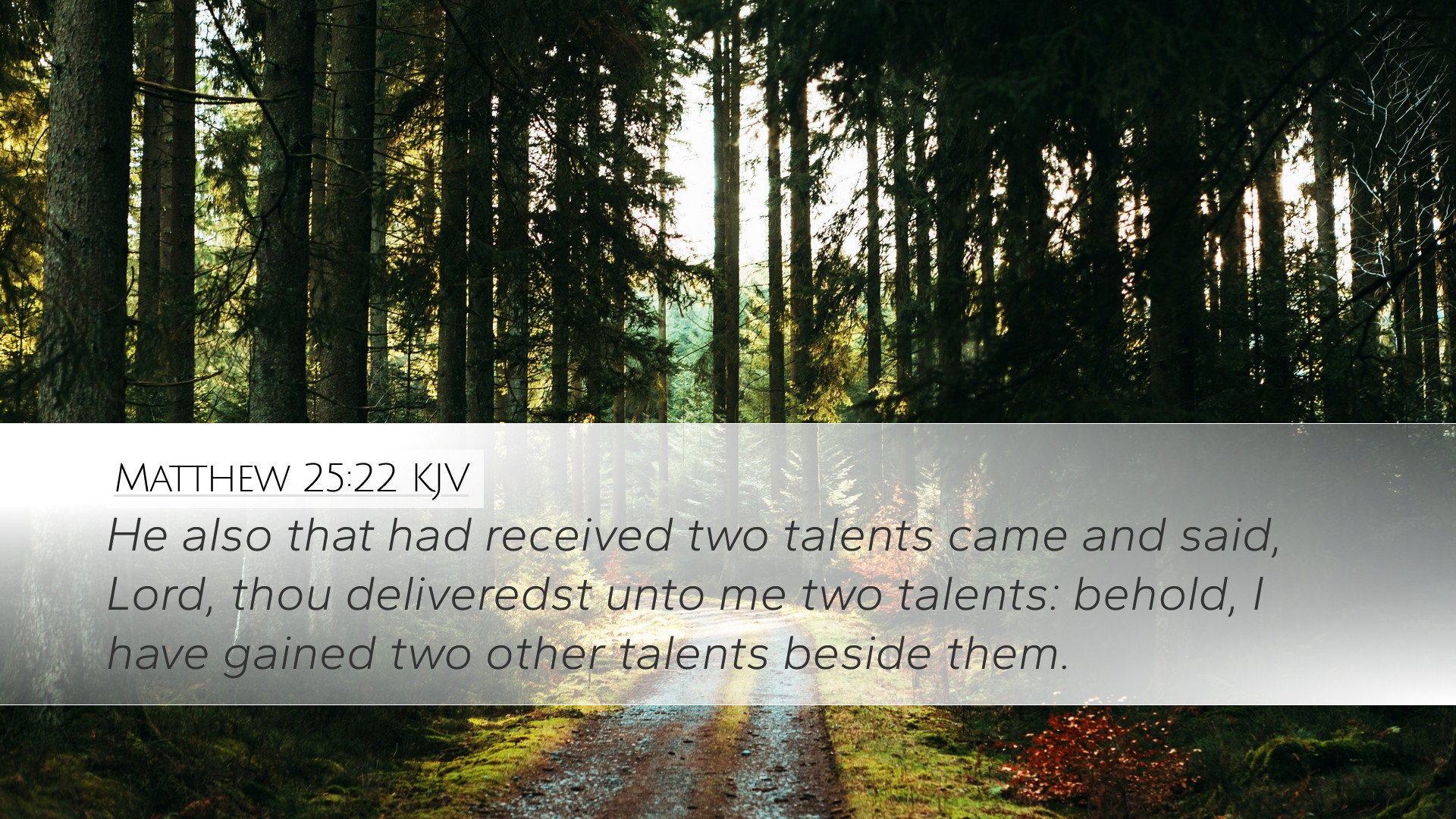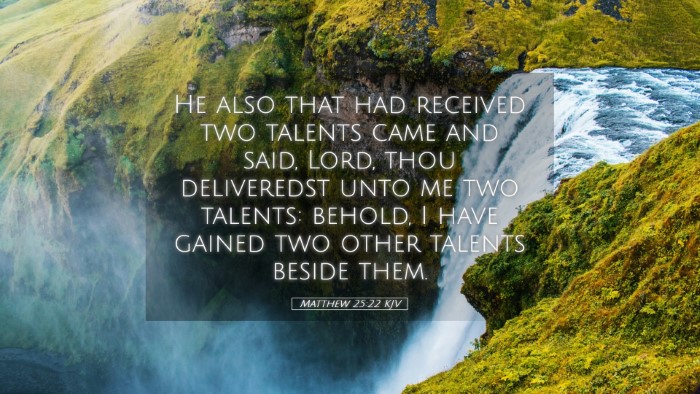Commentary on Matthew 25:22
Verse Context: Matthew 25:22 reads as follows: "He also who had received the two talents came forward, saying, ‘Master, you delivered to me two talents; here I have made two talents more.’” This verse is part of the Parable of the Talents, where Jesus teaches on the importance of using the resources entrusted to us wisely and diligently.
Introduction
The Parable of the Talents holds profound implications for stewardship, accountability, and the joy of service in God’s kingdom. In focusing on Matthew 25:22, we explore how the servant who received two talents responds to his master with obedience and fruitfulness. The insights provided by renowned commentators like Matthew Henry, Albert Barnes, and Adam Clarke enrich our understanding of this pivotal text.
Insights from Matthew Henry
Matthew Henry emphasizes the character and actions of the servant who received two talents. According to Henry:
- Faithfulness in Servitude: The servant’s diligence reflects his faithfulness. He acknowledges his master’s investment by working hard to double the talents. Henry notes that the servant did not compare himself to the one who received five talents but instead focused on being industrious with what he had been given.
- Joyful Accountability: The response of the servant is marked by a sense of responsibility. Henry asserts that the servant’s excitement in presenting his gain to the master is pivotal in recognizing the joy of serving God and the importance of stewardship.
- The Master’s Approval: Henry highlights that the master’s praise, “Well done, good and faithful servant,” speaks to the rewards of faithfulness. This approval is not based on the amount produced but on the faithfulness in utilizing one’s skills and resources effectively.
Insights from Albert Barnes
Albert Barnes approaches the text with a focus on the theological implications of stewardship. His commentary includes:
- Spiritual Investments: Barnes elucidates that the talents symbolize various endowments God bestows upon individuals—be it time, skills, or opportunities. The servant’s faithfulness implies a spiritual duty to invest what God has allocated to us.
- Equality in Responsibility: Barnes notes that all servants are held to the same standard of faithfulness, regardless of the amount they have received. This encourages readers to realize that God does not judge us by the magnitude of our gifts but by the faithfulness with which we deploy them.
- Harvesting Returns: According to Barnes, the doubling of the talents illustrates the expectation of growth in spiritual and practical realms. He argues that true faith will manifest in tangible outcomes, marking the importance of action in the Christian life.
Insights from Adam Clarke
Adam Clarke provides a broader contextual understanding of the parable, specifically commenting on the societal implications:
- Cultural Context: Clarke explains that in the time of Jesus, talents were substantial sums. The servant's ability to generate an equal return showcases not just personal gain but wise investments in the kingdom’s work. This reflects a robust understanding of stewardship within the cultural milieu of Jesus' audience.
- Integrity and Honor: The integrity of the servant in returning to his master with an account reflects a deep sense of honor and respect. Clarke underscores how this aligns with the ethical standards expected in the realm of service.
- Preparation for Accountability: Clarke stresses that this parable is a foreshadowing of the eventual judgment where all believers will give an account of their lives. The servant’s readiness to present his return demonstrates preparedness that all should aspire towards.
Theological Reflections
The interpretation of Matthew 25:22 extends beyond the historical and cultural context into profound theological reflections that are meaningful for pastors, students, and theologians:
- The Nature of God’s Kingdom: The parable encapsulates the dynamics of God’s reign where every believer is entrusted with responsibilities. The expectation of multiplication underscores a proactive participation in the divine mission.
- Empowerment through the Spirit: The presence of the Holy Spirit empowers Christians to maximize their talents. The active nurturing of gifts aligns with Paul’s exhortation in 1 Corinthians 12 regarding spiritual gifts being actively ministered within the body of Christ.
- Judgment and Reward: There is an eschatological element in this parable where the faithful servants are ultimately rewarded, encouraging believers to engage in diligent service as showcasing their faith in a God who rewards those who seek Him.
Practical Application
Reflecting on Matthew 25:22 offers vital applications for contemporary Christian living:
- Personal Inventory: Believers are encouraged to take stock of their resources—time, talents, and treasures. Understanding what God has entrusted to them is the first step towards effective stewardship.
- Active Engagement: The parable calls Christians to actively engage in service, whether in their local churches, communities, or broader missions. Each believer has a part to play in God’s kingdom work.
- Community Responsibility: The act of sharing talents among the community fosters a culture of collaboration and unity. The concept of 'body ministry' portrays how every member’s contribution is vital to the health and growth of the church.
Conclusion
Matthew 25:22 serves as a clarion call for believers to recognize their responsibilities as stewards of God’s grace and providence. The insights from Matthew Henry, Albert Barnes, and Adam Clarke converge to illuminate the text’s rich depths, urging a life characterized by faithfulness, accountability, and actionable growth. As we navigate our spiritual journeys, may we seek to hear the commendation, ‘Well done, good and faithful servant,’ resonating in our hearts and lives.


